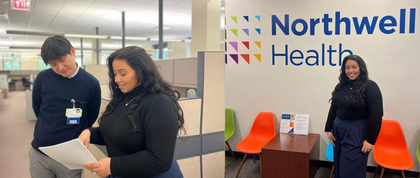
When she was young, Shana Moore-Pierre, MA '22, MPH '23 could not have known that her struggles with getting a diagnosis for PCOS would lead to a satisfying career as a clinical ethicist. "At one point I had nine of ten symptoms, including terrible migraines. Many women deal with it, but when I went to doctors my suffering was dismissed. When I was finally diagnosed years later I wanted to ask them, What took so long, and why did you shut me down? That experience—the anger of being unseen and unheard, when you knew it was actually valid—brought me to bioethics. There wasn't anyone to advocate for me, besides myself, and that's the challenge for a lot of patients. If you don't know the right words to say, you’re disregarded or met with this wall of paternalism."
Shana knew she wanted to help people in similar circumstances, "but I was still trying to figure out what helping looks like." Having earned a bachelor’s degree in biology and philosophy, she combined interests in both by enrolling at GPH to pursue an MA in Bioethics. For a practicum in medical ethics during the pandemic, she shadowed a doctor remotely from case to case, getting her first exposure to the field. "To help individuals I also had to understand populations and larger demographics, because they work together. Bioethics is very broad, and medical ethics is very individual, and then you have public health ethics, which is about populations."
Trying to holistically grasp the ethical and policy-related factors that affect clinical decision-making, Shana subsequently continued at GPH to earn her MPH in Health Policy, and after graduating was awarded an ethics fellowship at Northwell Health. "With the fellowship," she explained, "your degree can be in ethics, medicine, social work, the law, or anything else—but your focus is doing medical ethics consultations. In my fellowship I did close to 200 consults and, combined with what I learned from my MA practicum, it clarified my career goal of being a medical ethicist or a clinical ethicist. (Everyone argues about the terminology, but it's about the same thing.)"
"My fellowship was at Lenox Hill Hospital," Shana continued, "and I interacted with a lot of undomiciled patients, meaning they don't have anyone to represent them. It really stuck with me: Any of us could end up in a medical emergency, unable to communicate. There might be family or friends who could speak and advocate for you, but how far do we go to find them? How hard do we try? Even now, the law is ambiguous as to how much we should look for somebody's family members, or their surrogates. It says due diligence ... reasonable efforts. But what does that mean? Making a phone call, asking around if anyone knows you? And what do we do when there’s no one to advocate for that patient? Being able to explore with different teams is important, and advocating for patients so they know they can consult us. Sometimes patients say, 'I don't agree with what's going on right now; who can advocate for me?’ And that's where we get called in," she said.
As a clinical ethicist, Shana integrates a wide range of interdisciplinary perspectives. "There are nuances in aspects of the law, and family units and cultures make decisions differently. I speak with patients and their families, with healthcare teams, and sometimes state agencies like the Office of People with Developmental Disabilities, or the NYS Office of Mental Health. Situations are not black and white; there are a lot of gray areas, and decision-making requires a lot of different working parts."
Shana's broad knowledge enables her to interact on a daily basis with social workers, lawyers, nurses and doctors. "I can't do anything without team members; I'm always calling a social worker, even other fellows,” she said. “For instance, one past fellow was a gastroenterologist, so when it involves that part of medicine, I'll call to get their perspective. Another fellow, who was an attorney, was using a decision-making law in his work when he realized it had a flaw. He testified in front of the state senate to refine and improve the law, so as an ethics fellow he also got to be an advocate for the public."
It's these interdisciplinary conversations that speak to the richness of bioethics, said Shana. "The beauty and the challenge of being a medical ethicist is considering the different avenues, different perspectives. The best part is that it’s always a challenge; we're always asking, what about this, and what about that? We need differences to help out in the gray areas."
Shana’s dedication has motivated her to study for a doctorate in bioethics at Loyola University. She explained, "I had a wonderful experience at NYU, but even with two master’s degrees and a fellowship, there’s more to learn to be fully rounded in bioethics. First, I teach at hospitals and at Hofstra Medical School, so I want to be a better educator, to pass on what I’ve learned to others. Second, I plan to write and publish my research. When you advocate for patients and those who make decisions for them, then you turn and work with health teams and agencies, you can see gaps between the two, and how improved policy can bridge them. Third, when my experience in bioethics enables me to speak with authority, I want to support through leadership those who are actually doing the work. So: teach about these gaps I see in consultations; write and publish to improve policy and procedures; and kind of put what I’m doing out in the world through all those avenues, giving back at the same time to those who are next in line. Those are three things I aim to achieve."